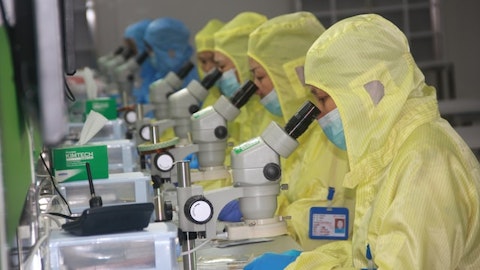Ross Muken: That’s a great question, right? And so, I would say, overall, we view the regulation as positive. This has been quite a good result for us in Europe as well, if you think about IVDR. And so, we’re essentially using the same playbook we saw with IVDR for the U.S. with LDT, albeit to my other point of gross margins, there might be a higher professional service component as the potential pace of transition is probably a bit more, I would say, expedited than what we’ve seen with IVDR, although that’s been pushed out several times. And so, I think the need for a validated platform and the ability to track QMS events, right? This is all stuff we already do to some degree. And so now, it’s more formalizing. So, I think the pressure on our customers essentially to move to a validated platform will just be higher.
Because the ability to maintain your own pipelines or multiple district pipelines and approaches, I think will be quite a challenge. And so, it’s our view that the ultimate net of this will be, I would say, a positive. But obviously, we’ll monitor the situation. We have to see the final rule. We’re eagerly awaiting as I’m sure you are. But in the end, regulation tends to be favorable to larger-scaled players, which I would say fits our profile.
Tejas Savant: Super helpful. Thanks so much. Appreciate it.
Operator: The next question comes from Mark Massaro with BTIG. Please go ahead.
Unidentified Analyst: Hey, Ross. Thanks for taking the questions. This is [Vivian] (ph) on for Mark. So, in terms of the strong HRD growth that you’ve been seeing for some time now I think, just how sustainable do you think that growth is and just where you think you are in the adoption curve? Thanks.
Ross Muken: Sure. So, I think relative to the initial opportunity in ovarian, we’re making very good progress. And I think our share in many key markets has been quite high. And so, as we’ve spoken about before, the next phases of growth for HRD will come as the class of PARPs kind of moves out of ovarian into other indications. And so, we’re obviously monitoring that incredibly closely. We think as a signature overall, this will continue to be quite important. I’m not quite sure, right, we can sustain the growth we saw this year as we’re sort of in the early phases of kind of the product cycle. But ultimately, for us, HRD and solid tumor overall remain a really key element of the platform. It remains quite, I would say, a popular application for us as we look at our pipeline, and we’re eager to continue to work in this category, particularly with our pharma partners over time.
Unidentified Analyst: Okay, perfect. And then, as far as the BioReference customer add last quarter, what has the early feedback on MSK-ACCESS been there? And just how winning that account has helped move along conversations with other large U.S. customers?
Ross Muken: Yeah. So, I don’t want to specifically comment on a customer, but I would say, overall, we’re quite happy with both the pipeline we’ve built for MSK-ACCESS as well as, I would say, the early experience of what we’re seeing both in our own R&D lab as we decentralized the solution as well as we’re starting to bring it to some of our early access customers. So, stay tuned. We hope to have more updates here. But overall, I would say, things are progressing quite well and I’m incredibly proud of the hard work of the team. I do think, again, for us, this remains a really unique partnership with MSK and an asset that over time for us that could really, I would say, transform elements, not just of our business, but of care in the decentralized world.
The types of conversations we’re having with institutions and I would say the places in the world we think we can take this are really quite expanded from what I would have thought even six months ago. And so, I’m incredibly encouraged around the early interest and now it’s on us to turn that activity and interest into revenue, right? And so, I would say, again, this will be something that plays out primarily for us in the second half of this year, but will move into ’25 as well. Kellen, you want to maybe comment as well on the biopharma opportunity?
Kellen Sanger: Yeah, sure. So, specifically, for liquid biopsies and MSK-ACCESS, we’re getting a lot of interest, as Ross mentioned, in the clinical market. It’s one of those solutions where you bring the Memorial Sloan Kettering name and the customer almost immediately perks up both our existing customers who might want to add that application as well as new customers that we’re speaking to. You mentioned BioReference. We also announced Tennessee Oncology at JPMorgan. But outside of the clinical market, we’re also getting a lot of attraction from biopharma. So, we announced a collaboration earlier last year with AstraZeneca, who is sponsoring the deployment of our HRD application in Spain. We gave an update today on that and mentioned that it was an incredibly successful partnership.
We’re now, I think, testing approximately 90% of all HRD patients in Spain, which has been a great success. And we announced later last year, that we’re going to be expanding that partnership with AstraZeneca and they’ll now be sponsoring the deployment of both MSK-ACCESS and MSK-IMPACT globally. So, this is really exciting for us in the liquid biopsy space as they help offer their footprint to reach more clinical customers globally. And then, that’ll help also with MSK-IMPACT, which is slated to launch later this year.
Unidentified Analyst: Perfect. Thanks so much, guys.
Operator: [Operator Instructions] The next question comes from Conor McNamara with RBC Capital Markets. Please go ahead.

